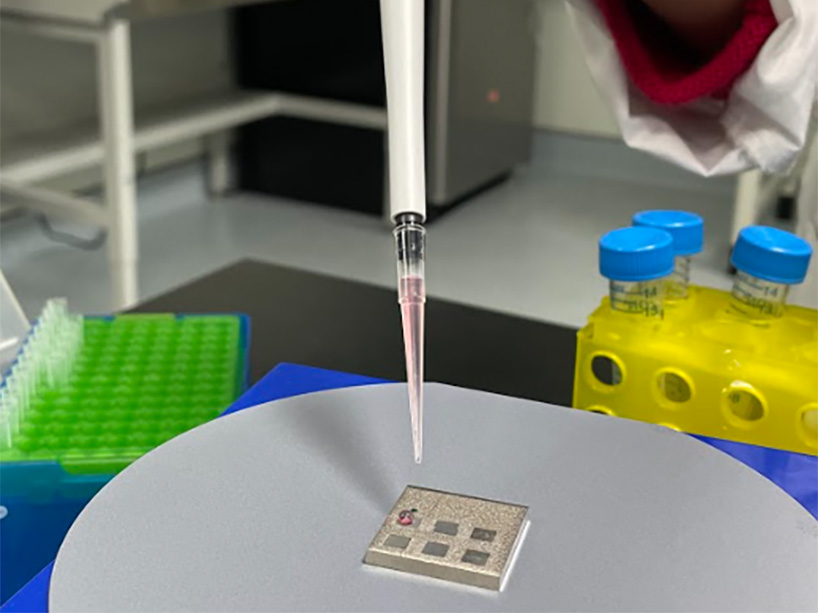Groundbreaking cancer screening research detects brain tumours in blood

Researchers from TMU and St. Michael’s Hospital can detect brain tumour content using blood samples. Called a liquid biopsy, this could transform how cancers are screened in the future.
As little as five microlitres of blood could be used to detect tumour content in cancer patients with incredibly high accuracy, according to Toronto Metropolitan University (TMU) and Unity Health Toronto researchers from the Institute for Biomedical Engineering, Science and Technology (iBEST).
TMU professors and iBEST members Bo Tan (Aerospace Engineering) and Krishnan Venkatakrishnan (Mechanical Engineering), along with postdoctoral fellows Rupa Haldavnekar and Swarna Ganesh have been working with Dr. Sunit Das, a neurosurgeon and scientist from St. Michael’s Hospital, a site of Unity Health Toronto, using a highly sensitive nanosensor to test blood samples. The nanosensor, a small device that measures physical quantities and turns them into signals, can detect cancer biomarkers in blood. This practice is referred to as a liquid biopsy and can effectively detect cancer in patients before the more conventional practices of imagery (MRIs) or traditional tissue biopsies.
“The way we monitor cancer patients is to have an MRI every three months,” said Das. “No one has a system that would allow us to do MRIs every week, but conceivably, we could do a blood test every week. This could be a surveillance tool that could give oncologists a heads up about changes in their patient’s cancer.”
The health-care system in Ontario is currently facing staffing shortages and longer wait times for procedures, in part due to the COVID-19 pandemic. Das says that the liquid biopsy could have a significant impact on the current wait times patients are experiencing due to a lack of resources needed for traditional cancer screenings.
The group has tested hundreds of blood samples for the past two years. Most recently they were able to use the nanosensor to detect brain cancer content in blood (external link) , which until now, was incredibly difficult to do due to the limited amount of blood in the brain. Tumours were detected with 100 per cent accuracy and tumour location was detected with 97 per cent accuracy, making the liquid biopsy a reliable source for deep surveillance of brain cancer, something that currently doesn’t exist.
“Right now, most cancers are diagnosed at stages two, three, four,” said Tan. “If the blood test can detect tumour content, we can catch them at a very early stage, before the patient even shows symptoms.”
Long-term, the research group is looking to make the liquid biopsy a common cancer screening tool for high-risk patients. For example, Tan says the liquid biopsy could be done on an annual basis for early detection purposes in people who have family history with cancer.
“COVID really accelerated the use of artificial intelligence in medical practice,” said Das. “If we were talking about this liquid biopsy research three years ago (pre-COVID), I would have said a development like this would take 10 years. Now I think it could be possible in four or five years.”
They are currently testing blood samples for tumour content accuracy with common cancers like breast, lung and colon. Das says that this could be more than a cancer diagnostic tool, too. The nanosensor has the potential to look for brain injury or multiple-sclerosis biomarkers in blood.
“Congratulations to professors Tan and Venkatakrishnan and their collaborators on this important advancement in cancer detection,” said Steven N. Liss, TMU’s vice-president, research and innovation. “The highly sensitive nanosensors developed by this team represents impactful research and is an excellent example of how collaboration between researchers and clinicians can accelerate critical health innovations.”
iBEST is a partnership (external link) between TMU and St. Michael’s that combines the university’s engineering and science expertise with the hospital’s biomedical research and clinical knowledge. This research was supported by Natural Sciences and Engineering Research Council of Canada (NSERC) Discover Grants, Alliance Grants and an Idea to Innovation Grant.